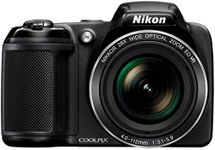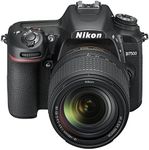We Use CookiesWe use cookies to enhance the security, performance,
functionality and for analytical and promotional activities. By continuing to browse this site you
are agreeing to our privacy policy
Best Nikon Camera For Beginners
From leading brands and best sellers available on the web.#2

Nikon
Nikon Z 30 16-50mm Kit , Black
View Product
#3

Nikon
NIKON D5600 AF-P DX NIKKOR 18-55mm f/3.5-5.6G VR Kit
View Product
#4

Nikon
Nikon Z 50 16-50mm Vr Lens Kit Digital Camera with 3.2-inch Tft Lcd, Black
View Product
#5

Nikon
Nikon D3500 AF-P DX NIKKOR 18-55mm f/3.5-5.6G VR Kit, Black, Standalone
View Product
#6

Nikon
Nikon D3300 24.2 MP CMOS Digital SLR Camera with 18-55mm Zoom Lens - Black
View Product
#7

Nikon
Nikon Coolpix L340 20.2 MP Digital Camera with 28x Optical Zoom and 3.0-Inch LCD (Black)
View Product
#8

Nikon
NIKON D3400 AF-P DX NIKKOR 18-55mm f/3.5-5.6G VR Kit
View Product
Buying Guide for the Best Nikon Camera For Beginners
Choosing your first Nikon camera can be exciting but also a bit overwhelming with all the options available. The key is to focus on what you want to photograph, how much you want to learn about photography, and how comfortable you are with technology. Start by thinking about whether you want a camera that is easy to use right away or one that gives you room to grow as you learn more. Understanding the main features will help you pick a camera that matches your needs and makes photography enjoyable.Sensor SizeThe sensor is the part of the camera that captures light and creates the image. Sensor size affects image quality, especially in low light, and how much of the scene you can capture. The two main types are APS-C (also called DX) and full-frame (FX). APS-C sensors are smaller and make cameras lighter and more affordable, which is great for beginners. Full-frame sensors are larger and offer better image quality, but they are usually found in more advanced cameras. If you are just starting out, an APS-C sensor is usually the best choice because it balances quality and ease of use.
MegapixelsMegapixels tell you how many tiny dots make up your photos. More megapixels mean you can print larger photos or crop your images without losing detail. For most beginners, anything between 16 and 24 megapixels is more than enough for everyday photography, sharing online, and making prints. Higher megapixels are only necessary if you plan to make very large prints or crop your photos a lot. Focus on other features rather than just chasing the highest megapixel count.
Ease of Use and ControlsHow easy a camera is to use depends on its menu system, buttons, and whether it has helpful guides built in. Beginner-friendly cameras often have simple menus, automatic modes, and on-screen tips to help you learn. Some cameras have touchscreens, which make changing settings easier. If you are new to photography, look for a camera that offers a 'Guide Mode' or similar help features, so you can learn as you shoot without feeling overwhelmed.
Autofocus SystemThe autofocus system helps the camera quickly and accurately focus on your subject. A good autofocus system is important for capturing sharp photos, especially of moving subjects like kids or pets. Entry-level cameras usually have fewer focus points, which is fine for most everyday situations. If you plan to photograph sports or wildlife, look for a camera with more focus points and faster focusing. For general use, a basic autofocus system will work well and keep things simple.
Size and WeightThe size and weight of a camera affect how comfortable it is to carry around and use. Lighter, smaller cameras are easier to take with you everywhere, which is great for travel or casual photography. Heavier cameras can be harder to handle, especially for long periods. Think about how and where you plan to use your camera—if you want something you can easily bring along, choose a compact and lightweight model.
Lens CompatibilityNikon cameras use different types of lenses, and not all lenses fit every camera. Entry-level cameras often use DX lenses, which are smaller and lighter. As you learn more, you might want to try different lenses for different types of photography. Make sure the camera you choose can use a wide range of lenses, so you have room to grow. If you want to keep things simple, start with a camera that comes with a versatile 'kit lens' that covers most situations.
Connectivity FeaturesModern cameras often have features like Wi-Fi or Bluetooth, which let you quickly share photos to your phone or computer. This is handy if you like to post photos online or back them up easily. If sharing is important to you, look for a camera with built-in wireless features. If you prefer to transfer photos with a cable or memory card, this may not be as important.




